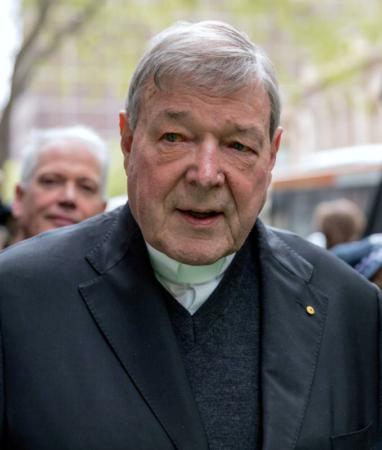World
Australian commission publishes redacted report sections on Cardinal Pell
By Michael Sainsbury
Posted: 5/7/2020


Australian Cardinal George Pell leaves the Melbourne Magistrates Court in 2017. (CNS photo/Mark Dadswell, Reuters)
VALLA BEACH, Australia (CNS) -- The Royal Commission into Institutional Child Sexual Abuse published redacted sections of its 2017 report, and new findings said it did not believe some of the testimony given to it by Cardinal George Pell.
In Sydney, Cardinal Pell issued a statement saying he was surprised by some of the commission's views, because they were "not supported by evidence."
The Royal Commission, which ran from 2013 until it handed down its 16 volumes of findings in 2017, had previously redacted some sections concerning Cardinal Pell while criminal proceedings against him remained in the court system. The April 7 ruling by the High Court of Australia, dismissing his conviction of abusing of two choirboys, paved the way for the release of the unredacted report.
Sections that had been edited said the Royal Commission, which has judicial powers, rejected much of the evidence that Cardinal Pell gave via video link from Rome in February 2016, before the cardinal, who was serving as the Vatican's finance minister, returned to Australia to face criminal charges. In that testimony, the cardinal denied any knowledge of pedophilia by priests.
"We do not accept that (then-) Bishop Pell was deceived, intentionally or otherwise," the commissioners found.
But the commission also rejected the allegation made against Cardinal Pell that he had attempted to bribe a victim of abuse to stop him complaining to police about his uncle.
The almost five decades in question covered the time when then-Father Pell was advising the former bishop of Ballarat as consultor and when he was auxiliary bishop of Melbourne. The cardinal, who was involved in the transfers of two prominent priests, denied knowledge of their activities at the time.
Gerald Ridsdale was one of Australia's most notorious child molesters who was later jailed for abusing at least 65 children; he has been laicized. Father Peter Searson died in 2009 without being convicted.
Ridsdale one of Australia's most notorious child molesters who was later jailed for abusing at least 65 children.
The Royal Commission rejected Cardinal Pell's testimony that Ballarat Bishop Ronald Mulkearns lied about the need to move Risdale from his parish.
"Cardinal Pell gave evidence that the bishop did not give the true reason for moving Ridsdale -- namely, his sexual activity with children -- and that the bishop lied in not giving the true reason to the consultors,'' the commission wrote.
"It is implausible given the matters set out above that Bishop Mulkearns did not inform those at the meeting of at least complaints of sexual abuse of children having been made," the commissioners wrote.
In his May 7 statement responding to the newly revealed sections of the report, Cardinal Pell said the Ballarat diocesan consultors who testified said they did not learn of Ridsdale's offending against children until much later or they had no recollection of what was discussed. None said they were made aware of Ridsdale's offending at these meetings.
The cardinal's statement also noted that, when he was archbishop of Melbourne, he placed Searson on administrative leave in March 1997 and removed him from his parish two months later.
Victims groups welcomed the release of the unredacted report.
The release of the full report coincided with the start of the Australian Catholic Bishops' Conference semi-annual plenary meeting, held by video link for the first time since the conference was formed in 1966, due to ongoing COVID-19 restrictions.
A spokesman for the bishops' conference said the group had no comment to make on the Royal Commission's report and "there won't be anything beyond yesterday's release on the plenary meeting until our post-meeting summary." The plenary meeting concludes May 14.
Ahead of the meeting, Archbishop Mark Coleridge of Brisbane, conference president, said the bishops had begun discussions with leaders of religious institutes and other Catholic ministries about a more collaborative approach to safeguarding children and vulnerable adults and the handling of complaints of sexual abuse and other misconduct.
"We've made good progress in devising even more robust structures and practices to respond to allegations and to create and maintain church environments that are safe for children and vulnerable adults," he said.
"This is a whole-of-church approach, and it's one that has been developed with input from a wide range of people, including survivors and their supporters," he said.